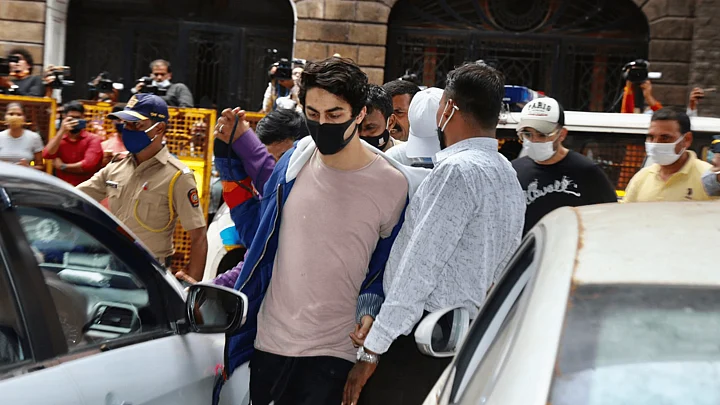The oddest thing about the Aryan Khan case is that after almost two weeks of daily reportage and constant hearings before the courts, we are still unsure as to what he has actually done. He is supposed to have attempted to enter the ship on which the rave party was to happen, but was detained before he actually boarded it. So, there’s no evidence of his interacting with anyone aboard to either consume or purchase narcotics. We know that the Narcotics Control Bureau (NCB) has found no narcotics in his possession.
He didn’t undergo a blood test to ascertain consumption and there’s certainly no evidence of his having purchased drugs on the day. No dealer who has been arrested has made the statement that Aryan Khan purchased narcotics from them. However, the NCB insists that much like Rhea Chakraborty last year, Aryan Khan, too, is part of an international drug trafficking chain. At every stage of the hearing, the case of the NCB seems to evolve and go beyond that which has been called out and is being conveniently allowed to develop in this manner. I assure the reader that this is a luxury defence counsel are rarely afforded.
What Really Is Evidence?
It is worth noting that Aryan Khan’s bail application has not been rejected on merits as yet (the one prior rejection is on a jurisdictional issue). So, we’re still not clear about what a court thinks of the evidence presented by the NCB. The best we can ascertain thus far is that consumption is based on certain statements made in WhatsApp chats, which the NCB deems to be extrajudicial confessions. I don’t think words can replace actual consumption. Possession is supposed to have been “conscious” or constructive”, whereby the 6 grams of charas found in the shoes of his close friend, Arbaaz, is deemed to be for Aryan’s benefit, and therefore, possession for Aryan’s use. Pardon the pun, but the NCB appears to have placed Aryan in Arbaaz’s shoes.
The Additional Solicitor-General’s (ASG) submission, as widely reported, was that the two messaged each other saying “let’s have a blast”. Those words were argued by the ASG to imply an extrajudicial confession. He interprets those words to mean evidence of conscious possession and conspiracy to consume. He is clearly misguided to the colloquial usage of “let’s have a blast”, which only implies having a good time and is not slang or colloquialism used only in the context of consumption of drugs. It could easily be inferred that the two friends were talking about having a good time on the cruise, which does not imply any intention to consume drugs.
The test for the grant of bail under the Narcotic Drugs and Psychotropic Substances Act, 1985 (NDPS) Act for simple consumption or possession is the same as that for any other offence under Section 439 of the Code of Criminal Procedure (CrPC).
However, the NDPS Act does depart from the CrPC in one material respect, which is that a person charged with being in control of trading in banned substances must establish to a “reasonable” degree that they are not guilty of the offence and are unlikely to commit the same in the future.
This is where the charge of illegal trafficking under Section 27A assumes importance. And yet, we see no submission from the prosecution in relation to anyone that Aryan has sold drugs to, or that he has been a conduit for the onward movement of drugs.
NDPS Act and Words Over Actions
In Rhea Chakraborty’s case, the Bombay High Court (HC) had eventually held that she hadn’t purchased for intent to sell for gain or profit, and so the charge under Section 27A would not lie. I suspect the NCB is again similarly trumping up charges in this case to confuse a person, who, assuming every piece of evidence to be true, is at best an end consumer with someone who is an actual dealer. A dealer needn’t be a consumer and a consumer needn’t be a dealer.
What should alarm us all is that jurisprudence under the NDPS Act has now moved to a point where words have replaced actions — idle WhatsApp chats are enough to prima facie establish a matter that previously required medical evidence.
This lightening of the prosecution’s burden confounds inasmuch as the NCB no longer needs to establish anything other than WhatsApp chats to validate arrest, and even these can be unrelated to the actual event for which the raid took place.
Imagine you are at dinner at a friend’s place and a week later that friend is arrested for possession of drugs. This is someone close to you, someone you’ve interacted regularly with over WhatsApp, whose habits you may or may not be aware of. If this is the standard, then why shouldn’t you be a suspect? After all, I’m quite sure we’ve all “had a blast” in our WhatsApp chats.
(The author is an advocate who appears regularly before the courts in Delhi/NCR. This is an opinion piece and the views expressed are the author’s own. The Quint neither endorses nor is responsible for them.)
